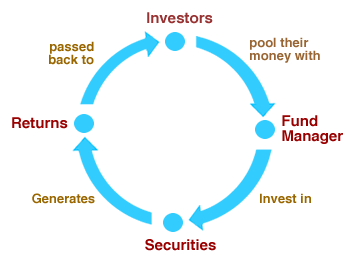I remember, when I advised one of my friends to invest via Mutual funds, he replied – “I am afraid of share market and that’s why I don’t want to invest in Mutual Funds. “
Do you also think, investing in mutual funds means investing in share market and it is as risky as share market. Then you are not correct and need to understand the basics of Mutual Fund.
It is a Myth that : Mutual Funds means Share Market.
Mutual Fund by itself is not an Investment but it is a way to invest in other products like Equity (Shares), Fixed Income, Commodity (Gold), Index, etc
Size of Mutual Fund Industry in India
As per AMFI, the total Funds under management as on 31-March-2012 is Rs 587,271 crores
There are 44 mutual fund companies in India operating 1000+ mutual funds schemes under various categories.
What is Mutual Fund
Mutual fund is a financial intermediary who collects money from group of investors and invest them as per pre-determined investment objective. The mutual fund will have a fund manager who is responsible for investing the collected money into specific securities (stocks or bonds or gold etc).
When you invest in a mutual fund, you are buying units of the mutual fund and thus on investing becomes a unit holder of the fund.
Example
For e.g Suppose there are 10 Investors want to invest Rs 1000 each, a total of Rs 10000 is collected. This Rs 10000 will be invested in various stocks as per the Scheme’s Investment objective. Suppose, the fund manager will buy 3 shares of Infosys @2000 and 4 shares of Reliance @1000.
The starting Mutual fund NAV is Rs 10, so the total number of units will be 1000 units. And each invester will get 100 units (Rs 1000 / Rs 10 NAV)
If the underlying share price goes up (say 10% ), the fund value will become Rs 11000. and the current NAV will be approx Rs 11 (Rs 11000 / 1000 units)
Each investor portfolio value will be 100 units X Rs 11 NAV = Rs 1100 (10% return on Rs 1000 investment)
Actually, the NAV will be bit less than Rs 11 as there are few charges applicable related to fund management fees, trade charges, etc. Such charges will not be more than 2.25% (as regulated by SEBI) and will be adjusted in NAV directly. So for e.g if the mutual fund expenses was Rs 100 in this whole process, the fund value will be Rs 10900 and NAV will be Rs 10.90. Each investor portfolio value will be Rs 1090.
Benefits of Investing via Mutual Fund
- Affordable – As mutual fund will trade in large volume, there will be economies of scale
- Professional Management – your funds will be invested & managed by a professional fund manager & team
- Diversification – you risks will be diversified. In above example, You could not have bought shares of Reliance & Infosys individually in Rs 1000, but now you get the benefit of upside in both Reliance & Infosys.
- Liquidity – it is highly liquid. if you reques to redeem your mutual fund before cut-off time, you will get your funds next working day
- Tax Benefit – there are some tax benefits when investing via mutual fund. for e.g Tax Savings Equity Scheme, shorter duration for long term capital gains for Gold ETFs as compare to physical Gold.
Read my post – Top 10 benefits / reasons to invest via Mutual Funds
Is it safe to Invest in Mutual Funds – Regulatory Authorities – To protect the interest of the investors, SEBI formulates policies and regulates the mutual funds. SEBI approved Asset Management Company (AMC) manages the funds by making investments in various types of securities. Custodian, registered with SEBI, holds the securities of various schemes of the fund in its custody.
Type of Mutual Funds
Wide variety of Mutual Fund Schemes exists to cater to the needs such as asset class, risk tolerance and return expectations etc. It is easier to think of mutual funds in categories, mentioned below.
By Structure – Open Ended , Closed Ended, Interval Schemes
| Open Ended Scheme | It is available for buy / sell all through the year. These do not have a fixed maturity. Investors can conveniently buy and sell units at Net Asset Value (“NAV”) related prices. |
| Closed Ended Scheme | These schemes have a pre-specified maturity period. One can invest directly in the scheme at the time of the initial issue and sell them later either on stock exchanges or to mutual funds through periodic repurchase. |
| Interval Schemes | Interval Schemes are that scheme, which combines the features of open-ended and close-ended schemes. The units may be traded on the stock exchange or may be open for sale or redemption during pre-determined intervals at NAV related prices. |
Most of the retail investors invest via Open ended schemes.
By Investment Objective – Growth, Income, Balanced, Money Market
For e.g HDFC Top 200 fund has given an annualised return of 22.50% since inception (1996). In 16 years, the NAV has gone up from Rs 10 to Rs 211
So through Mutual funds, you can invest in
Summary
Mutual fund is one of the best investment mechanism to create a long term wealth.
Retail investor should invest periodically via Systematic Investment Plan (SIP) in open – ended Equity Schemes (Growth Option) for a longer term.
In other posts, I will explain the factors in selection of Mutual fund scheme and taxation aspects of mutual fund investments.
Read my other post on – Best Performing Mutual Funds to Invest in India

